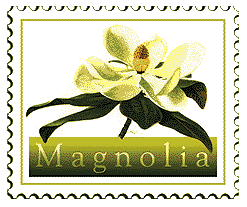
State Flower:
Magnolia
In November 1900 the state's schoolchildren were asked to choose a State Flower. The children attacked the assignment with relish. The results were: Magnolia received 12,745 votes; Cotton Blossom came in second at 4,171 votes, and Cape Jasmine came in third carrying 2,484 votes. A few other votes were cast for other flowers, but the Magnolia was the clear winner. However, the Legislature did not officially designate the Magnolia as the State Flower until 1952.
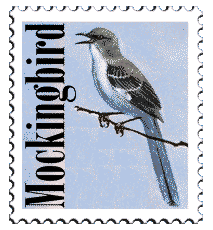
State Bird:
Mockingbird
In 1944 the Mississippi Women's Federated Clubs campaigned the State Legislature to recognize the Mockingbird the official State Bird. Found in all areas of the state the cheerful Mockingbird was approved by the Legislature and named the official State Bird in 1944.
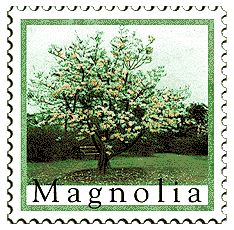
State Tree:
Magnolia
In 1935 the Director of Forestry started a movement to canvas the state's schoolchildren to vote for a State Tree for Mississippi. Of the four nominations -- Magnolia, Oak, Pine and Dogwood, the Magnolia received an overwhelming majority, and on April 1, 1938 the Mississippi Legislature designated the Magnolia as the official State Tree.
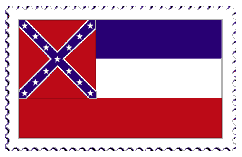
State Flag:
The Mississippi flag shows a combination of accents from the American flag and the Confederate flag.
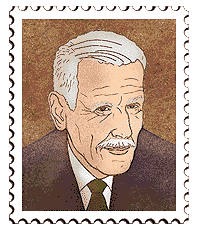
Famous Person:
William Faulkner
He was born on September 25, 1897 in New Albany, but the family soon moved to Oxford where he remained for most of his life. The oldest of four sons, "Billy" was sent to public school but had little patience with formal education and quit high school in his second year. Yet he had a thirst for knowledge, which he pursued on his own, and was an avid reader (he even taught himself French so he could read French authors). When the woman he loved, Estelle, married another man and moved to the Orient, Faulkner enlisted in the Canadian Royal Air Force. When he returned to Oxford after WWI, he was admitted to the University of Mississippi "by special dispensation for returned troops," he said. But he didn't stay long. Later he worked odd jobs, earning enough money for "paper, tobacco, food, and a little whiskey." He was mostly a loner, although he spent six months in New Orleans and six years on the Left Bank of Paris, he never really mixed well with literary people. His second novel, "Mosquitoes" was a satire on the literary circle in New Orleans. In 1929 his love, Estelle, returned to Oxford after her marriage failed and the two were married that following June. After his marriage, his writing efforts intensified. Before his death on July 6, 1962, Faulkner had written 30 books and had been awarded the Nobel prize for literature. He is considered one of the greatest American writers of the 20th Century.